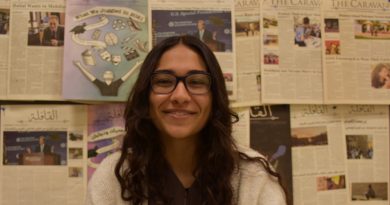Egypt Seeks to be Investment Hub
BY SARAH EL-SAFTY

The Egypt Economic Development Conference (EEDC), inaugurated on Friday in Sharm El Sheikh with leading global figures, including US Secretary of State John Kerry, Italian Prime Minister Matteo Renzi and Ruler of Dubai Sheikh Mohammed bin Rashid Al Maktoum, concludes today with a number of deals already signed.
The EEDC is designed to reposition Egypt on the global investment map and attract aid from a total of 112 countries that are represented at the conference.
On Friday, Gulf leaders pledged a total of $12.5 billion in aid and investment to Egypt.
Saudi Arabia, the United Arab Emirates, and Kuwait each pledged $4 billion in financial aid and investments to Egypt, while Oman pledged $500 million.
“We all have to stand by Egypt because its security and stability is the cornerstone in the security and stability of the region,” said Sheikh Al Maktoum.
One of the most ambitious aspects of the conference was the unveiling of Egypt’s new administrative and business city, on the outskirts of Cairo.
The $50 billion plan for the new site was also released on a website called “The Capital Cairo” earlier on Friday.
The website stated that “Cairo Capital is a momentous endeavor to build national spirit, foster consensus, provide for long-term sustainable growth and address various issues faced by Egypt through a new city, which will create more places to live, work and visit.”
According to local press, Egypt presented 60 different investment projects worth a total of $60 billion at the conference.
Egypt has already signed a $2.5 billion agreement to boost its electric power grid.
Some of the most anticipated projects include The Suez Canal Axis development project and a high-speed electric train East of Cairo that would connect El-Salam City to Obour City, Al-Shorouk City and El-Robiky.
Organizers hope that highlighting the country’s economic and political stability will boost investor confidence and produce a road map for comprehensive economic and social reforms.
“The importance [of the conference] doesn’t lie in the fact that it is one event and that’s it. You need to create the image that you have changed your country’s investment environment in a way that would make the local investment, even before the foreign investment, come and continue,” Abla Abdel Latif, advisor to the minister of industry and foreign trade and economics professor at AUC, previously told The Caravan.
In order to ensure the success of the conference, the government has been working on three different tracks: the organization of the conference, the rights of the investor, and the reviewing of all related legislation that would attract investors.
The vision of the conference and its goals are to be clearly announced for both foreign and local investors. Abdel Latif stressed on the importance of “not waiting for them to tell us what to do” by creating a clear road map for investors.
Egypt’s cabinet has also approved a long-awaited unified investment law on March 4, which would provide many incentives that could bring in more investors, especially to remote areas like some Upper Egypt governorates.
Procedures regulating financial and commercial matters are currently found within many statutes making their implementation challenging.
The new unified law would ease the processes for investment in Egypt and fix a major flaw in the legislative system by combining different laws within a single unified unit.
However, the process did not come without challenges. Abdel Latif had said that the investment law had been “changed a million times” until it was set. But she stressed that an investment law isn’t enough; rather, a change in the entire investment environment would be needed.
The Competition Factor
In a world of increasing global competition, nations are now required to find their niche, or platform advantage.
The patterns of competitiveness are different in every country; values, culture, economic structures and institutions all contribute in finding a nation’s competitive edge. A nation can succeed in gaining competitiveness in a particular industry because of that difference.
Economics Department Chair Tarek Selim is hoping that the EEDC will enable Egypt to clearly identify the competitive advantage.
“Before we wanted to be good in everything: manufacturing, agriculture, tourism. Now, for example, we are focusing on logistics as an important sector especially with the Suez Canal,” he said.
As for the outcome of the conference, focusing on small and medium enterprises (SMEs) can stimulate demand through job creation, innovation, and competition making them economic drivers.
Abdel Latif added that because SMEs, such as the components industry, usually have strong linkages with many sectors, their impact spreads over a big portion of the economy.
Alternative Aims
Marketing Egypt as a secure country is another EECD imperative.
The recent attacks against Egyptian military and various explosions across the country in the weeks leading to the conference may have hurt the initiative.
However, Abdel Latif doesn’t think this will greatly affect the conference.
“The security incidences are extremely painful but they are more or less scattered and the image for the whole world is that you have started to stand up on your legs.”
However, she said that it is important to focus on a road map for long-term reform and not to “tie your life [to] the conference.”
She added that this conference “is one small [step] in a big process of improving the performance.”



